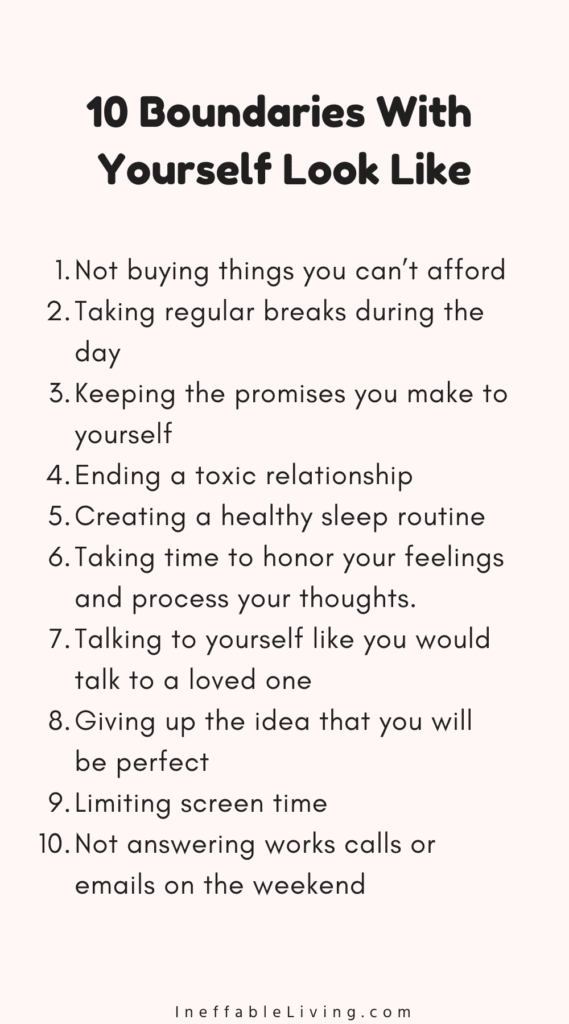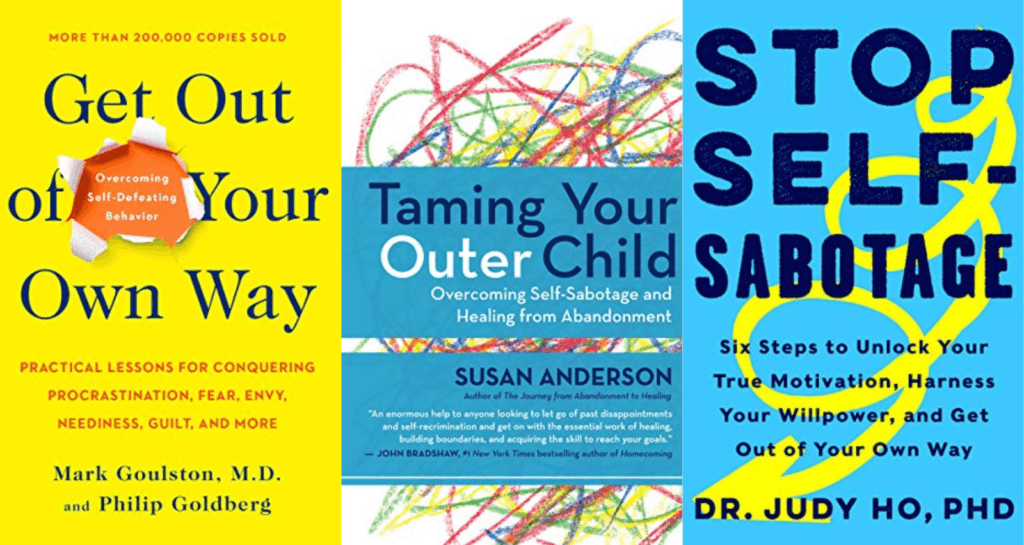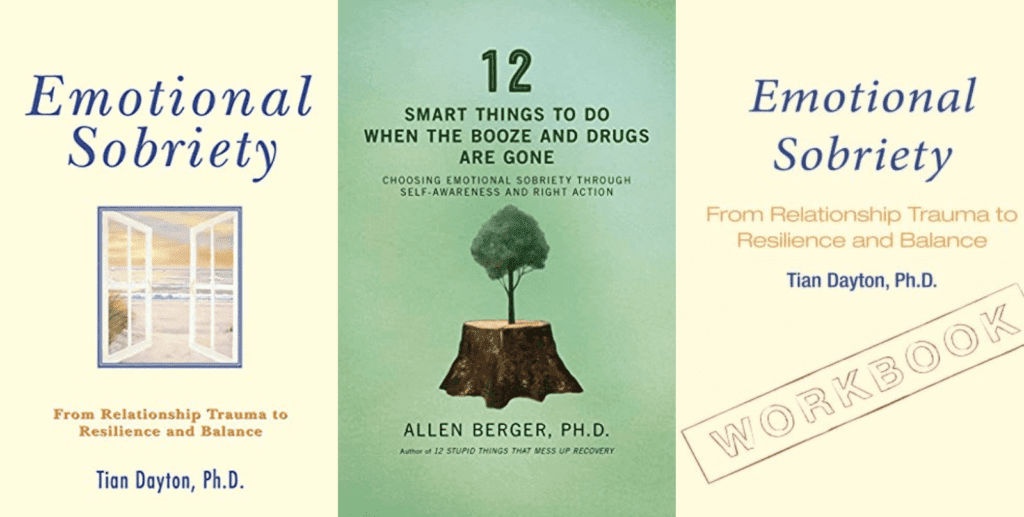The following are some of the best self-sabotage books to help on your healing journey.
Disclosure: Some of the links below are affiliate links. This means that, at zero cost to you, I will earn an affiliate commission if you click through the link and finalize a purchase.
Common Forms of Self-Sabotage
Self-sabotage can take different forms, and it’s important to recognize them in order to address and overcome them. Here are some common forms of self-sabotage:
1. Procrastination: Delaying tasks and putting off important actions can hinder progress and result in missed opportunities.
2. Negative self-talk: Engaging in negative self-talk, such as self-criticism or doubting one’s abilities, can undermine self-confidence and motivation.
3. Perfectionism: Setting excessively high standards and being overly critical of oneself can lead to paralysis and avoidance of taking necessary risks or completing tasks.
4. Fear of failure: The fear of failure can prevent individuals from taking risks, trying new things, or pursuing their goals, ultimately stifling personal growth.
5. Self-destructive behaviors: Engaging in harmful habits or behaviors, such as substance abuse or unhealthy relationships, can sabotage overall well-being and progress.
6. Lack of self-care: Neglecting self-care, including physical and mental health needs, can result in decreased energy, focus, and overall functioning.
7. Imposter syndrome: Feeling like a fraud and doubting one’s accomplishments can lead to self-sabotaging behaviors, such as holding back or not seeking opportunities for growth.
8. Avoidance of discomfort: Avoiding uncomfortable situations or challenging emotions can limit personal growth and prevent individuals from reaching their full potential.
It’s important to remember that recognizing self-sabotage is the first step towards positive change.
Developing self-awareness and practicing self-compassion can help break these patterns and pave the way for personal growth and success.
Self Sabotage Books

1. Get Out of Your Own Way
By Mark Goulston, Philip Goldberg
Practical, proven self help steps show how to transform 40 common self-defeating behaviors, including procrastination, envy, obsession, anger, self-pity, compulsion, neediness, guilt, rebellion, inaction, and more.
Related: How To Break Generational Trauma? 5 Steps To Release Trauma & End Self-Sabotage

2. Stop Self-Sabotage
By PhD Judy Ho
In Stop Self-Sabotage, licensed clinical psychologist, tenured professor, and television personality Dr. Judy Ho takes a fresh look at self-sabotage to help us answer two vital questions: Why do we do it? How do we stop?
Combining therapeutically proven strategies with practical tools and self-assessments, Dr. Judy teaches you how to identify your triggers, modify your thoughts and behaviors, find your true motivation, and unlock your willpower to stop this vicious cycle in its tracks. Practical and transformative, Stop Self-Sabotage is your ultimate guide to jumpstart lasting, positive change and start living the life you want.
Related: Inner Teenager Healing: 14 Proven Exercises to Heal Your Inner Teenager

3. Taming Your Outer Child
By Susan Anderson
Your Outer Child acts out and fulfills your legitimate childlike needs and wants in the wrong place, at the wrong time, and in counterproductive ways: It goes for immediate gratification and the quick fix in spite of your best-laid plans.
Now, in a revolutionary rethinking of the link between emotion and behavior, veteran psychotherapist Susan Anderson offers a three-step program to tame your Outer Child’s destructive behavior.
Related: Top 10 Signs Of Toxic Shame In A Person (+Best 20 Healing Shame Exercises)

4. Get Off Your “But”
By Sean Stephenson
In addition to presenting Sean Stephenson’s unbelievable life story, Get Off Your “But,” offers anyone who needs to conquer fears and insecurities a hands-on guide for overcoming the forces of negativity and self-sabotage. Sean—a successful psychotherapist—shows what it takes to overcome the big bumps in the road, eliminate excuses, end insecurities, and ultimately stand up for happiness and success in life.
Related: Top 25 Inner Child Journal Prompts To Heal Your Inner Wounds

5. Self Sabotage No More
By Jennie Potter
After two decades of personal experience, study, and client work, she is finally releasing her knowledge, wisdom, and practices into a short, powerful book to help people get out of their own way once and for all. “Self Sabotage No More” are the mindsets and methods that Jennie’s been sharing and using with clients to great success and transformational results.
Self Sabotage Workbooks

6. The Self-Sabotage Behavior Workbook
By Dr. Candice Seti
The Self-Sabotage Behavior Workbook is a game changer for those struggling with counter-productive and damaging habits. This friendly guide includes:
- Journal prompts to help you understand your triggers
- Visualization ideas to conquer negative thought cycles
- Mental exercises to strengthen your resolve
- Real-life case-studies
- And much more!
Related: Self-Abandonment: What Is It & How To Get Back In Touch With Yourself

7. Your Resonant Self Workbook
By Sarah Peyton
Your Resonant Self Workbook: From Self-sabotage to Self-care takes us through the world of relational neuroscience and, using the lens of unconscious contracts, explores how our brains, nervous systems, and bodies react to the brains, nervous systems, and bodies of others. Case studies, resonant-language practice, questionnaires, meditations, and journaling provide readers with healing strategies for uncovering and rewriting these contracts. Following Your Resonant Self, this workbook provides the tools to turn inward with kindness, warmth, and curiosity and create opportunities for self-healing.


How Self-Sabotage Books Can Help
Self-sabotage books can be incredibly helpful in addressing and overcoming the patterns and behaviors that hold us back from reaching our full potential.
Here are a few ways in which self-sabotage books can assist you:
1. Awareness: These books can help you become more aware of the self-sabotaging behaviors and thought patterns that may be hindering your progress. By understanding these patterns, you can begin to recognize when they arise and how they impact your goals.
2. Identification: Self-sabotage books often provide examples and case studies that allow you to identify with the experiences of others who have struggled with similar challenges. This identification can be empowering, as it shows you that you are not alone and that change is possible.
3. Strategies and Techniques: These books offer practical strategies and techniques to help you break free from self-sabotaging behaviors. They may include exercises, mindfulness practices, goal-setting techniques, and other tools to support your personal growth and development.
4. Changing Belief Systems: Self-sabotage often stems from deeply ingrained belief systems that limit our perception of ourselves and what we can achieve. These books can guide you in challenging and reframing these beliefs, empowering you to create new, more positive belief systems that support your success.
5. Accountability and Support: Many self-sabotage books provide guidance on building accountability and support systems to keep you on track. They may suggest finding a mentor, joining support groups, or developing a network of like-minded individuals who can cheer you on and hold you accountable for your actions.
Conclusion
Self-sabotage books are just tools to help you along your journey.
The true transformation comes from taking action, implementing the strategies and techniques, and being patient, kind, and gentle with yourself throughout the process.



